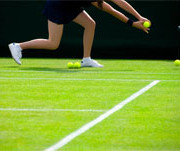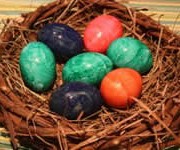Tennis fever: Top French tennis phrases
With Wimbledon upon us, it’s time to pick up more than your racquet…here are our top tennis expressions in French and English!
With tennis season in full swing – the French Open recently finished and Wimbledon finally here – it is customary for local tennis courts to become full as wannabe Federers dust off their racquets and tennis fever sets in.
This year why not impress your friends with more than your passing shot? Here we bring you essential tennis vocabulary and expressions in French, for use on or off court and preferably with a bowl of strawberries (fraises) and cream (crème) to enjoy afterwards.
Top 10 French Tennis Vocabulary:
| Backhand | Revers |
| Forehand | Coup droit |
| Serve | Service |
| Smash | Smash |
| Game, set, match! | Jeu, set et match! |
| Umpire | Arbitre |
| Ballboy | Ramasseur / ramasseuse de balles |
| Out! | Out! |
| Foot fault | Faute de pied |
| Tramline | Couloir |
Top 10 French Tennis Expressions:
| Great shot! | Joli coup! |
| You cannot be serious…that shot was in! | Vous n’êtes pas sérieux… la balle était bonne! |
| Can I have another ball please? | Je peux avoir une autre balle s’il-vous-plait? |
| I saw the chalk flying! | C’était pleine ligne! (J’ai vu la craie voler) |
| Somebody’s mobile has gone off in the crowd | Un téléphone portable a sonné dans le public |
| It’s another ace! | C’est un autre service gagnant / ace! |
| He’s broken his serve! | Il a fait le break! |
| That’s a killer drop shot | C’est un amorti gagnant (qui tue) |
| The rain covers are coming out…play is suspended | Les bâches imperméables sont sorties…le match est suspendu |
| It’s gone to a tie-break…there’s nothing between them! | Ca va être un jeu décisif / tie-break…un rien les sépare! |
Wimbledon takes place from 29th June – 12th July 2015. Cactus runs foreign language evening courses in Wimbledon and in other locations across London and the UK.
English courses in London are also available throughout the year.




